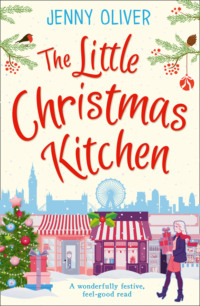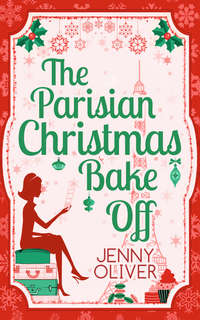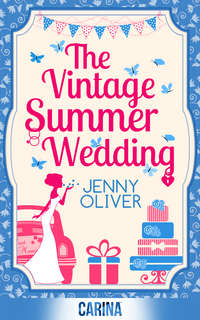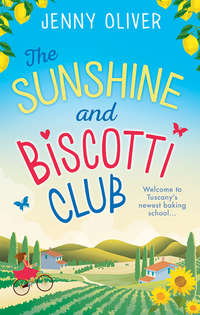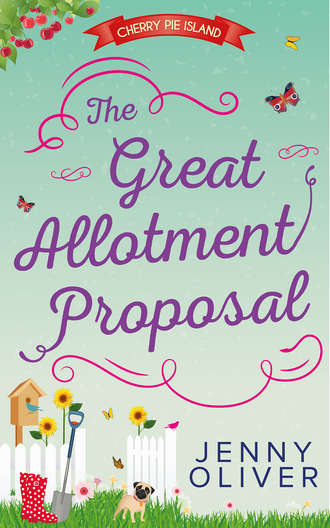
Полная версия
The Great Allotment Proposal
‘Jack was in Peru or somewhere,’ said Annie, turning to her and wiping some of the stray algae off Emily’s cheek with a tissue. ‘Here, use this, you’ve got loads more still on your face,’ she said before looking back towards Jack. ‘He’s come back. Hasn’t been around that long. And, to be honest, I only knew because other people told me. He’s living on a fishing boat apparently.’
‘What do you mean he’s living on a fishing boat? Is he a fisherman? I thought he was an engineer?’
Annie shook her head, ‘I have no idea, honestly. I just heard he was living on a fishing boat.’
‘Where?’ Emily asked.
Annie shrugged.
‘You ladies OK?’ Jack shouted as he got near.
Emily took a couple of steps closer and peered at him. Then, seeming to finally believe Annie when he took off his hat and ran a hand through his hair, said, ‘Why didn’t you tell me it was you?’
‘You’re welcome, Emily,’ he said, one side of his mouth tipped up in a half-smile.
‘Did you recognise me?’ she asked, taking another few steps forward as Jack went back to his allotment and picked up his spade.
‘Of course.’
Emily frowned. ‘Well you should have said hello rather than acting all mysterious and bearded. It’s unfair.’
He laughed. ‘You have algae on your face.’
Emily picked up the hem of her T-shirt and wiped her face with it. ‘Is it gone?’
Jack glanced up from where he’d started digging, ‘No.’
She wiped her face again. ‘Gone?’
He looked up and shook his head.
Emily narrowed her eyes and then turned to Annie, who was untangling the hose to finish watering the plot. ‘Do I have algae on my face, Annie?’ Emily shouted.
Annie peered at her. ‘No.’
Emily looked back at Jack who had his head down and was supposedly concentrating on digging, but she could see the smirk on his lips. She opened her mouth to say something but didn’t know what.
No one. No one made her feel like Jack did. No one ever had. Like she was off balance. Not in control. Even his hair and his beard threw her off. Everything he did, everything he said, seemed to catch her on the wrong foot. It was all too calm, too slow, too all-seeing. He stood up and wiped the sheen of sweat off his forehead, saw her still watching him and leant against his spade to watch her back. ‘Does that happen to you often?’ he asked, tilting his head towards the river were the paparazzo had been unceremoniously dumped.
‘Fairly often,’ Emily nodded.
‘I don’t know how you can live like that,’ he said.
She shrugged. ‘We don’t all want to live on fishing boats.’
He snorted a laugh. ‘I need to talk to you about that actually.’
‘Why? If it’s to ask me to sail away with you,’ she said with a half-smile. ‘Then the answer’s no.’
As soon as she’d said it, she wished she hadn’t. Even in jest she knew it was an awkward, stupid thing to say.
He narrowed his eyes then sort of laughed, shook his head and went back to digging his hole.
‘Go on then, why did you want to talk to me about your boat?’ Emily said.
The soil cracked under the edge of the spade. ‘Because,’ he said with a pant as he dug deeper into the earth, ‘I’m kind of living on your property. On your mooring.’
‘Are you now?’
He stopped digging and looked directly at her, sky-blue eyes on a face dirty with sweat and mud. ‘Yeah. I didn’t realise the house had been sold.’
‘What, so I’m kind of like your landlady?’ Emily bit her nail. If she still knew Jack at all she knew that he hated being beholden to anyone. Almost as much as he hated rules and regulations.
‘Suppose so.’
‘Well I’ll have to work out some kind of rent, won’t I?’ she said.
‘Or you could just let me be?’ he said with a shrug of his shoulder.
A sly grin stretched over Emily’s face. ‘And where would the fun be in that?’
Chapter Four
Everything Emily remembered about Montmorency Manor had been destroyed by its previous owners.
When they finally completed, she didn’t even need a key to unlock the door, just a code punched into a panel that had been chipped into the Georgian stone.
‘Bloody hell.’ Annie’s boyfriend, Matt, stood in the centre of the hallway and looked all the way around him. ‘What have they done to this place?’
Gone was the sweeping wooden staircase that Emily had slid down in a bikini one summer to get Jack’s attention as he was talking to Wilf, in its place was a glass-panelled effort with silver handrails and two giant silver statue newel posts. Gone were the flagstones and the huge antique rugs and the marble fireplace next to which the giant Christmas tree had stood as the fire crackled. Now the hallway was carpeted in lime shag-pile and the walls and ceiling were painted black. They’d ripped out the cornicing and spray-painted silver skulls on the walls.
The front door opened and Matt’s teenage son, River, sloped in with their pug dog, Buster, and hovered behind Emily and Annie.
‘What happened to you?’ Matt asked, glancing round Annie to see him.
‘Nothing, I was on the phone,’ River mumbled. ‘Can I go to the loo?’
‘Yes,’ Emily said, mimicking his grumpy teenage voice, but he didn’t find it funny, staring back at her blankly. Pretending to be chastised, she waved her hand in the direction of the bathroom and he slouched off, the dog trotting behind him, the spotlights along the corridor changing colour from red to blue to green as he went.
‘What’s wrong with him?’ Emily asked after he’d gone.
‘Girl trouble,’ Annie said. ‘He won’t talk about it.’
‘Ah, poor River.’ Emily did a sympathetic laugh.
‘Poor us, more like!’ Matt rolled his eyes as they walked through into the kitchen. ‘He’s a nightmare to live with.’
‘Don’t!’ Emily bashed him in the chest. ‘Young love is really hard.’
Matt just shook his head as if he’d had enough of it all and then whistled when he saw the kitchen. ‘Wow!’ he said, and went over to prod one of the huge leopard-print high stools bolted to the ground around a white island pod.
Emily put her hands over her eyes. ‘I know. It’s hideous,’ she said, remembering the open wooden shelves covered in Bernard’s paraphernalia from various trips abroad, the white pillar-box tiles, the Aga that they’d taken turns to see how long they could sit on as teenagers, the big wooden table covered with Bernard’s make-up equipment – tool-box style boxes filled with tubes of foundation, plastic pots of lipstick and glosses, tubes of mascara and leather pouches for brushes that were stained and marked from use. She remembered the first time he’d done her make up – the flick of the eyeliner, ‘Follow the line of the bottom lash and fill in the curl from the top’, the Russian Red on her lips, the tiny splodge of colour on the apple of her cheeks, ‘You could be in the pictures, my dear.’
She remembered when she started shadowing him on set. How he refused to admit that he needed any help, that it was starting to get a little bit much for him, but when the director of a small-time soap opera spotted Emily and asked her to audition for a role, Bernard was the first to jump in and say she was a make-up artist not an actress. It was only as she stared at this shiny, new kitchen, lamenting the loss of the old, that she realised he hadn’t perhaps needed her help as much as she had thought, but rather, perhaps he’d known how susceptible she would be to the film industry. The camera took quite a shine to the vivacious young blonde Emily and, of course, if it hadn’t nothing would have turned out the way it did.
‘They can’t have been allowed to do this?’ Annie said, pointing to where the original Georgian windows had been replaced by modern folding glass doors that opened out onto the garden.
Emily shook her head, ‘No I don’t think they were, but who’s going to enforce it? It’s overlooked by no one, they could do what they like. Wait till you see the bedrooms.’
River stalked back in, drying his hands on his jeans, ‘There are speakers in the ceiling of the toilet.’
‘There are speakers in the ceiling of every room,’ Emily said. ‘And the fireplace is now a video screen of a fire that you control on another wall panel. It’s ridiculous.’ She sashayed over to stand by River, who visibly blushed at the nearness of her and bent down to pick up Buster for protection. ‘I hear you’re having girl trouble,’ she said, scratching the dog’s head.
‘Emily—’ Annie cut in, but Emily waved her away.
River’s eyes had gone wide, like he couldn’t handle the confrontation. Buster yelped to get down.
‘Don’t look so terrified, darling,’ Emily said, taking the dog from him and plopping him back on the floor. ‘I’m just going to say, if it feels worth it don’t bloody blow it. Yes? Buy her something that she’ll like, apologise and tell her why you did whatever it is you did.’
Matt was standing by the leopard-print stool, Buster at his feet, one hand rubbing his forehead, clearly thinking Emily was making a mistake.
But to all their surprise, River said, ‘She won’t listen.’
‘Of course she won’t seem like she’s listening,’ Emily said. ‘But she is listening, trust me.’
‘Well she doesn’t seem like she’s listening.’
‘That’s because she wants you to try harder,’ Emily said, then she paused. ‘Actually, I have no idea what I’m talking about. My relationship history is terrible.’
River sniggered.
‘But…’ she paused. An image of Jack and her on the hay bale flashed into her mind. ‘I think women want to be fought for. I think we want to know that we’re worth it. But that might just be me,’ she laughed, then did a big, dramatic sigh and said, ‘Right, people, as much as I want to show you round all the other ghastly rooms in this house, I have to love you and leave you. You’re welcome to stay and have a nose, but I am needed at a very lavish charity ball at the Dorchester and I cannot go looking like this.’ She pointed down to her red cotton shorts and bright-blue mesh T-shirt.
Half an hour later, as Matt, Annie, River and the pug were exploring the second-floor bedrooms – one of which had been turned into a mini-gym and sauna – Emily came flying down the stairs wearing a backless, full-length, slinky turquoise gown. Her hair had been plaited into a complex series of knots, her make-up was so flawless and she looked so beautiful that they were all rendered speechless for moment.
‘OK?’ she asked, doing a mini side-to-side twirl.
Annie smiled and nodded as the two men next to her just stared. ‘You look amazing,’ she said.
Emily did a little clap of excitement, then peered out the window. ‘There’s my car,’ she said. ‘See you later. Have a swim in the pool if you like,’ she called out behind her. Then she was gone. And the three of them stood there, almost in shock. It was as if, with Emily there, they had been standing an inch above ground and suddenly, with her gone, they were all back down on the floor again.
Chapter Five
It was still light outside when Emily came home. She’d left earlier than she might normally. The paparazzi on the red carpet had put her through the ringer. It was one big club; hurt one and you hurt them all, and they’d given her a vicious verbal beating for the earlier incident at the allotment. Then they’d shouted all sorts of nonsense to get her attention, none of it good. She knew the photos from the event would have her looking startled or purposely caught at odd, unflattering angles. She’d smiled as they snapped but knew it wasn’t the right smile – tight and unfocused, lacking her usual control.
She slipped her shoes off as she stood in the hallway of the manor and breathed in the cool silence as the moonlight cast its glow through the high Georgian windows. She was positive the house she once knew was still there, underneath all the layers of paint, graffiti art and feature wallpaper.
But even just resting her hand on the stainless-steel banister, she knew she had a lot of work ahead to find it.
Upstairs, in the fading half-light of late evening, all the removals boxes in the garish master bedroom felt like a mountain looming over her. The spotlights in the ceiling glared out at full beam as she tried and failed to work out the dimmer option on the control panel. In the end she turned them all off in frustration and had to change out of her evening dress in the dark, hanging it carefully in the built-in mirrored wardrobe ready to go back to the designer in the morning. Her pyjamas were folded on her bed but it felt too early to put them on and she was too wired for sleep. So instead she pulled on a pair of grey jeans, a darker grey silk T-shirt and a pair of red leather flip flops and jogged down the stairs and out the house via the big glass kitchen doors.
Outside, the air smelt sweet, of honeysuckle and jasmine with the faint tang of chlorine from the pool. While the previous owners had mosaicked the surround of the pool and made a small trellised patio, which wasn’t that bad, they had done very little to the rest of the garden. The wide lawn, the grass yellowing from the harsh sun, still stretched out to the huge lime trees at the back. The Montmorency cherries stood in clusters on the right-hand side of the lawn, pecked to smithereens by the fat pigeons, and behind the pool some flowerbeds that her brother, Wilf, had built still stood, dominated by a massive pink fuchsia and a quince tree that had quadrupled in size.
Emily walked the edge of the garden, pausing once to glance back at the house which, from this angle, looked unchanged. The huge windows looked down at her, unblinking. She walked backwards a few more steps and then turned, knowing suddenly exactly where she was going.
At the end of the garden, where the lime trees towered overhead like sky-scrapers, was a dense network of bushes – an elderflower, some big rhododendrons and a huge purple buddleia – now all entwined with some errant brambles. It was overgrown, untended, the branches all meshed together, but Emily knew what she was looking for was there. She clambered in, pushing her way through the thicket, the branches scratching her arms, spiders’ webs catching in her hair, until finally her feet touched on the pebbles of the old path and her hands met the little wooden gate, once white, now scratched and grey. It took a couple of shoves to get it open and once through she had to contend with more brambles, an old apple tree and a bank of stinging nettles, but when she was out the other side the smell of the river hit her, tart and sharp. She heard the familiar lapping of water against the bank and the shuffle of startled ducks and she shut her eyes and breathed in.
‘Would have been easier to come round the side,’ a voice said.
‘Please don’t ruin my moment,’ Emily replied, holding a hand up to stop them saying more as she let the evening sun flicker on her face.
Jack laughed, ‘Sorry.’
Emily opened her eyes and looked at the bright fishing boat in front of her. Moored to her jetty that should have been neglected and decrepit but which had been mended, the broken posts re-carved, the white paint gleaming. The boat itself was like a mini-trawler painted various shades of turquoise and cobalt blue; bright-red buoys hung from the sides. Around the edge was a white stripe and on it at the front, written in black, was the name, That Jack Built. The cabin in the centre had been extended almost the full length of the boat and the mast had a white flag that flapped in the gentle breeze.
‘Nice boat,’ she said, shielding her eyes as she looked up to where he sat, his feet resting on the rail, slicing an apple with his penknife.
‘Thanks,’ he said, glancing up at her without lifting his head. ‘I like it.’
‘Are you going to invite me on board?’ she asked, head tilted to one side, watching him.
Jack paused mid-slice, then leant forward, his elbows on his knees. ‘Em, if you wanna come aboard, you come aboard.’
She felt her face smile as she watched him, all mellow nonchalance and laid-back cool.
He glanced up again. ‘Are you just going to stand there?’
‘No.’ She shook her head, a smile still playing on her lips. ‘No, I’m coming on board.’
As Jack stood to give her a hand up she felt his palm, all rough with blisters and hard skin. When she was on deck, instead of letting go, she held onto his wrist with her other hand and turned his over so she could see all the marks. ‘Are you bare-knuckle fighting or something?’
‘Would it turn you on if I was?’
Emily raised a brow.
Jack chuckled. ‘It’s the nature of the job.’
Emily let his hand go and walked around to the front of the boat, letting her fingers trail on the railing. ‘And what is that exactly? I thought you went off to become an engineer.’
‘I am an engineer. I’m also a carpenter. And a boatbuilder.’
She leant facing him with both hands on the railing behind her. ‘You built this?’ she asked, nodding towards the main cabin of the boat.
Jack nodded.
‘Impressive,’ she said.
‘What are you doing here, Emily?’
She shook her head. ‘I took a walk and this is where I ended up.’
Jack narrowed his eyes like he was debating whether to invite her in or send her home. Emily raised a brow back at him, almost in challenge.
‘You want some dinner?’ he said in the end.
‘OK.’
Chapter Six
The kitchen was tiny. The table even smaller. Emily sat with a glass of wine watching Jack cook. Throwing together the finest, simplest ingredients – tearing leaves from beautiful lush pots of fresh herbs on the window sill, slicing big juicy Spanish tomatoes, crushing plump smoked garlic and ripping up soft white mozzarella. She wondered where he’d learnt all these skills. He hadn’t been able to cook when she’d known him. Nor, for that matter, could he have built a boat. Not one as stunning as this one. The interior was all chestnut-coloured glossy wood, a worn bench ran along one side of cabin opposite a scuffed black furnace, plain white curtains rippled in the slight breeze and at the end of the room a soft tartan rug had been thrown over a big, high bed. Next to them in the kitchen there was an old worn Peruvian rug on the floor, a bunch of cushions scattered against the wall and a large window that opened up to look out on the river.
‘I really like your boat,’ she said.
Jack laughed as if her saying it was ridiculous.
‘What?’ she asked.
‘What are you doing here, Emily?’
‘Being my usual amazing self.’
Jack raised a brow.
‘I don’t know,’ she said. ‘I liked the idea of seeing you, I suppose.’
He narrowed his eyes at her as if assessing her motives.
She bit her lip and half-smiled, ‘Why don’t you believe me?’
‘Because my life is really simple now,’ he said, looking down to stir the saucepan full of rich tomatoey spaghetti. There was a tiny half-smile on his face, but she got the impression that he wanted to close his eyes and make her disappear.
‘I won’t make it complicated.’ Emily nudged his calf with her toe. ‘I promise.’
‘You make everything complicated,’ he said with a laugh and then waved a hand as if they should say no more. ‘OK, well here, have some pasta. You need more wine?’
She nodded and he topped up her glass with a smoky bordeaux that reminded her of sitting by the wood fire in her mum’s house in France. Then she picked up her fork and twirled up some spaghetti. The moment it hit her tastebuds, all the fancy canapés she’d eaten that night paled into insignificance. ‘How come you can cook like this?’
Jack sat back in his chair, one leg crossed over the other ankle to knee; he had the bowl of pasta in one hand and was twisting spaghetti with the other. ‘I learnt while I was in Spain.’
Emily made a face. ‘At that commune? I thought you were building stuff not cooking.’
He shook his head. ‘We had to do everything, it was totally self-sufficient. And it wasn’t a commune, it was a research centre.’
‘Yeah, but it was all hippy-dippy eco, wasn’t it?’
He winced. ‘No, Em, it was a research centre. We worked on creating sustainable engineering projects. It just happens to be self-sufficient and off-grid. So yes, you learn how to cook.’ He held up his bowl as if to show that that was how he had learnt to make such good pasta.
‘You did pretty well considering you were only there for a year. It sounds like my worst nightmare.’ Emily shuddered before putting a big forkful of pasta into her mouth.
Jack paused. ‘I wasn’t there for a year, Em,’ he said. ‘I was there for seven years.’
Emily frowned. She had too much pasta in her mouth to say anything so instead she just watched him as he carried on eating, not looking at her.
The summer of the Cherry Pie Island Festival was the hottest anyone had known. It had been too hot to do anything other than lie in the shade as the bees bumped lazily from flower to flower and dogs moaned. Occasionally they would roll themselves from the shade into the pool with a splash. It was the type of heat that you couldn’t fight so it was easier to give in. She and Jack would sprawl in a tangle of golden limbs, dreaming of a future as easy and uncomplicated as their humid, sticky days.
They both knew the future was ticking closer, but that only meant Jack at uni in London, home some weekends, and Emily, whose TV drama had been commissioned for another eight episodes, would carry on back and forth to Three Mills studios. It was perfect. There was nothing to keep them apart. They lay in bliss, eating fat, juicy cherries content in the future they had mapped to perfection.
The weather got hotter. The hosepipes were banned and the grass turned yellow and the flowers withered. The dog cried at night as the thick heat swamped them in their beds. The fans droned. There was no escape.
And then the arguments started between Jack and his dad. A workaholic driven by mountains of success, Alan Neil wanted Jack behind him in the business. Wanted it to pass down within the family. He’d niggled and pushed but now as the time came for Jack to go and the heat tapped incessantly, spiralling normal conversations into ferocious bickering, he started to question why he was going. His maths wasn’t good enough for engineering, they all knew it; he wouldn’t last the uni course. Alan was humouring him by letting him go; he’d struggle and he wasn’t the type to really knuckle down. If he didn’t get through the maths, then the whole thing was pointless. A waste of money. A waste of Alan’s money. Better to stay.
But Jack didn’t want to stay. He didn’t want to be his dad. In fact it was his dad who had driven him into the desire to leave, to do something else, to not be hovering on his phone at midnight, flying off to the States at moment’s notice, leaving the kids with the nanny or in front of the TV while he calmed some needy rock and roll star.
Emily started to get nervous.
Jack told her it would be fine. But Emily had lived her whole life being shipped from pillar to post, she had seen what happened when tempers frayed, when people were held in the palms of others, their choices stifled. She had seen her mother backed into a corner enough times, her power cut in an instant by her reliance on the money of the men she married. How in a fit of frustrated fury she would pack them all up and they would be gone. Or just as easily, and as often, someone else would pack their bags and throw them out.
Jack couldn’t bear being at the mercy of his father. You could see it in the wild dart of his eyes as they tried to lie outside in the heat, pretending it was as it was before. But sweat that had seemed slick was now sticky, irritating, too hot, too close.
And then it all happened at once. A chain of motion. Like a pinball machine in little French cafes.
Jack’s dad pulled the plug on his finances. But instead of making him stay, it pushed Jack to find other means of studying. Which he found in the deepest, hottest part of the Spanish desert. Where they grew tomatoes in polytunnels and filmed Wild West movies. An eco research centre where he would learn sustainable engineering.


